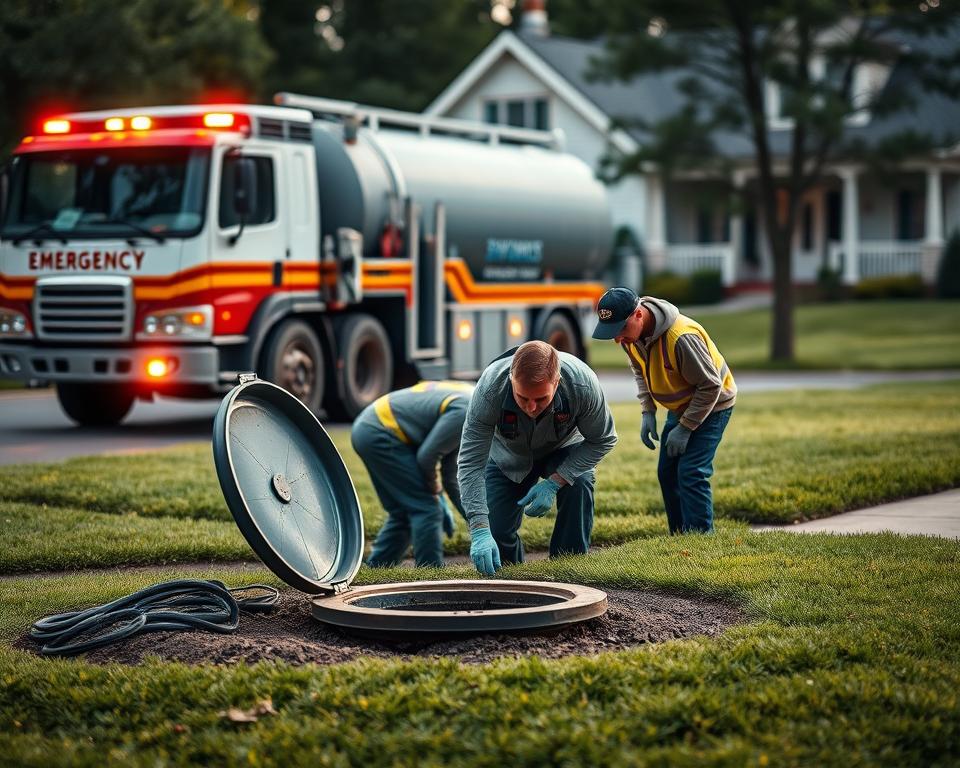Keep Septic System Cleaning for Tank Health
Ever wondered regarding the consequences of neglecting septic system care? For homeowners relying on these installations for wastewater treatment, foregoing regular care can lead to significant bills. It also introduces hazards to both health and the ecosystem. Pumping your septic system is far from a simple task; it’s crucial for guaranteeing your residence runs reliably. By regularly clearing out your septic tank, you prevent sediment accumulation and lengthen the service life of your setup. This preventive approach lets you avoid any troublesome situations. Learn the importance of septic tank upkeep and the methods entailed with septic tank pumping near me.
Main Points
- Scheduled septic system servicing is essential for warding off expensive restorations.
- Ignoring upkeep can lead to health hazards for your family.
- Understanding your septic system assists in proper stewardship.
- Signs of a troubled septic system should be noticed promptly.
- Professional contractors can assist in maintaining excellent tank health.
Grasping Your Septic System
A septic system is an effective in‑situ solution for handling wastewater. It mainly comprises two sections: the septic tank and the absorption field. Both are essential for providing safe treatment and safeguarding the surroundings.
The septic tank gathers wastewater from your home. Inside,, solid particles drop to the bottom, and effluent float to the surface. Naturally occurring bacteria within the tank decompose the organic material, making the effluent simpler to treat. This pre‑treated wastewater then moves to the drainfield for extra cleanup by the earth, completing the cycle.
It’s important for homeowners to understand the workings of their septic system. Knowing how the septic tank and field function together can lead to improved system care. This understanding supports proper maintenance practices, helping guarantee the system’s robustness.

Value of Consistent Septic System Cleaning
Regular cleaning of the septic system is crucial for home and ecological health. If overlooked, untreated wastewater can leak into your yard. This spillage can cause well water contamination, posing health hazards. By keeping the septic system clean, you safeguard your loved ones and the community.
It’s recommended to clean the septic system every 3‑5 years, depending on how much you load it. Such upkeep is not just good for the planet; it avoids costly fixes. A septic system that’s properly cared for functions better, providing a safer home environment and a safer ecosystem.
Indicators Your Septic Tank Needs Attention
Homeowners need to recognize signals that their septic tank may need pumping. Common signals to look out for include:
- Slow water flow in sinks, baths, and lavatories
- Unpleasant stenches near the absorption area
- Sewage returns in interior drains
- Prolonged soggy spots or overly green areas of grass on top of the septic system
It’s critical to recognize these symptoms early to avoid serious septic tank problems. Regular inspections are essential. They help spot issues before they escalate to costly repairs. Checking your system regularly ensures it functions well and endures longer.
Staying alert and responding quickly are essential for septic system maintenance. By monitoring these alerts, you can maintain your septic system in top shape.
Septic System Cleaning Intervals
Cleaning your septic system regularly is fundamental to keeping your home’s plumbing in top shape. Professionals usually suggest pumping the septic tank every three to five years. However, this can vary depending on the number of your family, how much usage you have, and the size of your tank.
If you have a high‑occupancy household that consumes more water, you could need to pump the system more frequently. Tracking your water consumption can guide you on if you need to revise your cleaning schedule.
All in Sanitation encourages setting up a steady pumping schedule that fits your household’s unique needs. Sticking to a routine maintenance plan helps keep your septic system operating efficiently and prevents expensive repairs.
Septic System Cleaning: Top Tips
For a septic system to keep healthy, homeowners must observe important practices. It’s critical not to flush non‑biodegradable items; doing so prevents clogs and keeps the system working well. Similarly, reducing chemical cleaners keeps the necessary bacterial ecosystem. These measures are vital for the system’s durability and performance.
Proactivity with scheduled inspections is key. Setting up routine inspections can spot issues quickly, allowing for prompt fixes. Additionally, reducing water through stopping leaks and careful usage aids septic tank health. These measures ensure the system runs effectively for decades.
It’s also important not to drive on the drainfield. Maintaining this area unobstructed allows it effectively process waste water, shielding your system from damage. Heeding advice from specialists like All in Sanitation also enhances septic system care.
The Process of Septic Tank Pumping
For homeowners, grasping the septic system service process is key. A licensed septic pumper should conduct routine septic tank pumping to ensure your system operating properly. The first step is checking the tank’s state to decide when it is due for pumping.
A septic tank needs pumping once the sludge occupy about 1/3 to 50 percent of its capacity. The licensed septic pumper will then remove these deposits. This step maintains the system’s performance. Furthermore, the visit may involve examining the tank for incipient issues, enabling quick fixes.
Holding a log of each pumping session is smart. This log enables you to keep tabs on their septic system’s upkeep, and is valuable if selling the property. Regular septic system maintenance extends its longevity and reliability, averting hefty fixes in the future.
Septic Tank Check‑Up: What to Watch For
Routine inspections are essential for your septic system’s health. Using a thorough septic tank inspection checklist can reveal possible issues early. Inspections should be carried out by a certified professional every one to two years. They will measure sludge levels and the scum layer’s condition during this check.
Inspecting the inlet and outlet baffles and effluent filters is also important. These components are critical for your septic system’s proper operation. Spotting leaks or malfunctions early can sidestep high repair costs. Preventive measures, like using an inspection checklist, extend your system’s longevity and efficiency.
Professional Septic System Services
Utilizing specialized septic system services is crucial for your septic system’s health. By choosing a company like All in Sanitation, you ensure that experts manage the cleaning, check‑ups, and fixes thoroughly. Licensed septic professionals carry special know‑how, helping homeowners to maintain the system’s optimal functionality long‑term.
Upkeep by licensed experts reduces the chance of sudden malfunctions and costly restorations. These services feature in‑depth inspections that assess the system’s status, identifying potential issues promptly. Taking this proactive stance substantially prolongs your septic system’s longevity.
At the end of the day, handing over your septic system to certified pros offers confidence. Collaborating with companies such as All in Sanitation taps into their experience. It ensures the integrity of your tank, creating trust in its maintenance.
Septic System Maintenance Tips for Homeowners
Homeowners have the power to maintain their septic systems functioning smoothly. Using effective care tips significantly improves their function. Implementing easy tweaks to water habits, like reducing unnecessary use and staggering the use of appliances, reduces pressure on the system.
Fitting efficient fixtures in your washrooms and cooking areas greatly supports septic longevity. These fixtures cut down water use without hurting performance. Skipping garbage disposals is prudent too, as they lead to more solids in the system, demanding more frequent upkeep.
Routine inspections and following a sound maintenance plan will lengthen your septic system’s life. Paying attention of everything that flows into your drains is crucial for keeping a robust septic environment. By embracing these habits, you’ll greatly benefit your septic system’s operation and lifespan.
Common Septic System Fixes
Septic systems may face various problems over time, necessitating repairs. Typical faults involve leaks, faulty baffles, and flow problems in the drainfield. By spotting the symptoms early, homeowners can address them swiftly, keeping their system remains in good condition.
Typical repairs involve:
- Swapping damaged parts to bring back system integrity
- Fixing or replacing cracked conduits to prevent leaks
- Unblocking blocked pipes to guarantee proper drainage
Handling septic problems quickly not only lowers outlays over time but also lengthens the system’s life. Scheduled check‑ups and maintenance can avoid these complications, supporting the upkeep of a healthy septic system.
Final Thoughts
Maintaining your septic system robust is central to planetary and household well‑being. Routine pumpings and check‑ups avert costly fixes and health risks. Being proactive with septic care protects time and minimizes concern.
Employing specialists like All in Sanitation ensures top‑notch upkeep suited to your requirements. Their expertise aids catch issues promptly, preventing major troubles and emphasizing the need for scheduled inspections.
Following best practices for septic maintenance delivers long‑term system performance. A bit of maintenance today secures a better‑functioning septic system in the future.


